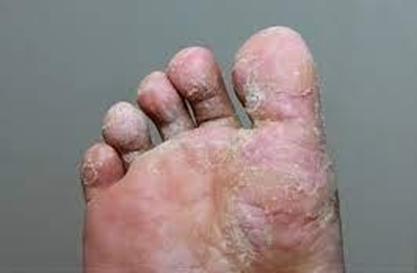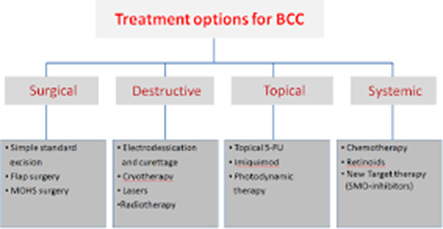A nurse in a provider's office is caring for a client who has a new diagnosis of tinea pedis, which of the following findings should the nurse expect?
Circular, erythematous patches on the scalp
Scaling and redness between the client's toes
Report of recent exposure to poison ivy
Report of a recent prescription for an antiseizure medication
The Correct Answer is B
Choice A rationale: Circular, erythematous patches on the scalp are more indicative of tinea capitis, a fungal infection affecting the scalp, and not tinea pedis.
Choice B rationale: Tinea pedis, commonly known as athlete's foot, typically presents with symptoms such as scaling, redness, and itching between the toes. It is a fungal infection affecting the feet.
Choice C rationale: Poison ivy exposure would result in contact dermatitis, characterized by a rash and blistering, rather than the typical presentation of tinea pedis.
Choice D rationale: Antiseizure medications are not typically associated with the development of tinea pedis; the symptoms described are more consistent with a fungal infection.

Nursing Test Bank
Naxlex Comprehensive Predictor Exams
Related Questions
Correct Answer is ["A","C","D"]
Explanation
Choice A rationale: radiation therapy is one of the possible management options for basal cell carcinoma (BCC) that uses high-energy rays to kill the cancerous cells.
Choice B rationale: this is incorrect since topical corticosteroids are ineffective in BCC management and may worsen the patient’s condition by suppressing their immune system.
Choice C rationale: micrographic surgery can be used in BCC management and it involves the removal of thin layers of skin to a point where no cancer cells can be detected.
Choice D rationale: this is appropriate and involves the use of electric current to burn off the cancer cells.

Correct Answer is A
Explanation
Choice A rationale: Erythema (redness) is the first indication of a superficial burn injury. Superficial burns, also known as first-degree burns, involve only the outer layer of the skin and are characterized by redness without blistering.
Choice B rationale: Eschar is associated with deeper burns and is not the first indication of a superficial burn.
Choice C rationale: Blistering is associated with partial-thickness burns (second-degree burns) and does not occur in superficial burns.
Choice D rationale: Pain is typically present in superficial burns, and the absence of pain is not a characteristic of superficial burns.
Whether you are a student looking to ace your exams or a practicing nurse seeking to enhance your expertise , our nursing education contents will empower you with the confidence and competence to make a difference in the lives of patients and become a respected leader in the healthcare field.
Visit Naxlex, invest in your future and unlock endless possibilities with our unparalleled nursing education contents today
Report Wrong Answer on the Current Question
Do you disagree with the answer? If yes, what is your expected answer? Explain.
Kindly be descriptive with the issue you are facing.
